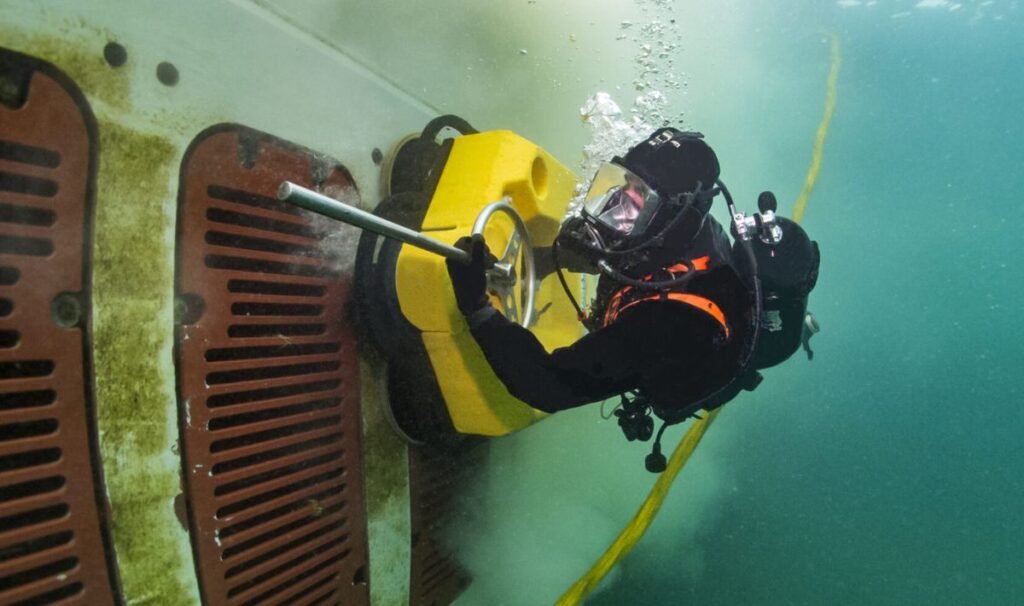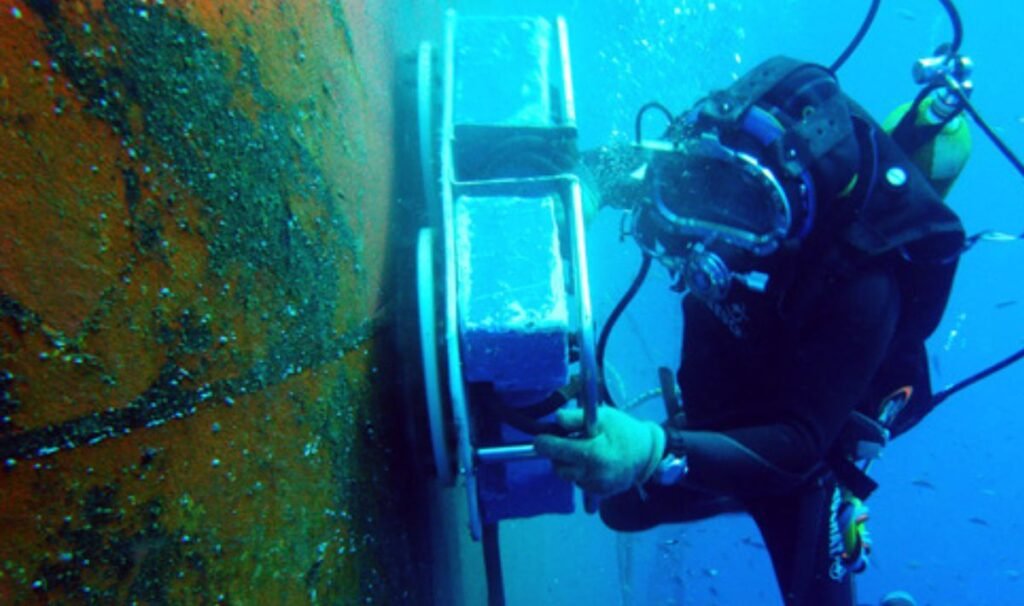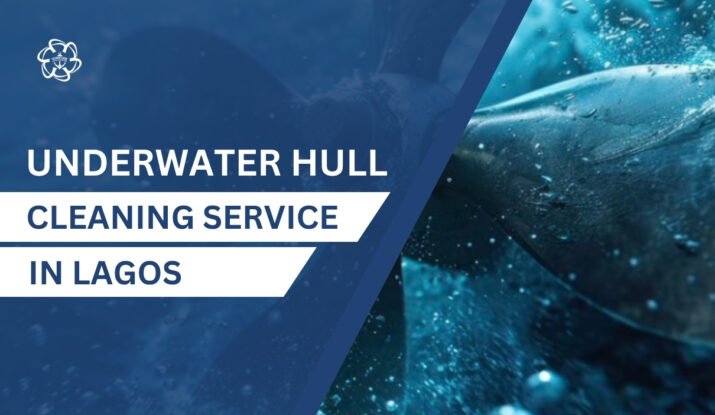Ever wondered how massive ships glide effortlessly into the busy port of Lagos? The secret often hides below the waterline—underwater hull cleaning in Lagos. In a city driven by maritime trade, keeping vessels efficient and seaworthy starts beneath the surface.
Over time, hulls accumulate marine growth like algae and barnacles, known as biofouling. This increases drag, reduces speed, burns more fuel, and raises operating costs. In Lagos’ high-traffic waters, neglecting hull maintenance can mean performance loss and regulatory trouble.
With professional underwater hull cleaning in Lagos, vessels stay efficient, eco-compliant, and cost-effective. Expert divers clean the hull while afloat, boosting fuel economy and performance, ensuring every ship entering or leaving this vital port does so in top condition.
What is Underwater Hull Cleaning in Lagos?
Underwater hull cleaning in Lagos is the process of removing marine growth, algae, barnacles, and other debris from the submerged part of a ship’s hull. Over time, these unwanted guests cling to the hull, increasing drag and reducing the vessel’s performance. Think of it as scrubbing the bottom of your boat so it can slice through water like a hot knife through butter.
Why is Underwater Hull Cleaning in Lagos Important?
A dirty hull is like running a marathon with weights strapped to your ankles. The extra drag means ships burn more fuel, move more slowly, and suffer more wear and tear. Regular cleaning keeps ships efficient, saves money on fuel, and even helps prevent the spread of invasive species that hitch rides on hulls.

The Unique Challenges of Lagos Waters
Lagos, with its warm, nutrient-rich coastal waters, is a paradise for marine life—and a headache for ship owners. The rapid growth of algae and barnacles here means hulls can get fouled up faster than in many other ports. Add to that the heavy ship traffic, and you’ve got a recipe for frequent, thorough cleaning.
Methods of Underwater Hull Cleaning in Lagos
Manual Cleaning
This old-school method uses divers armed with brushes and scrapers. It’s labor-intensive but effective for small vessels or spot cleaning.
Mechanical Cleaning
Here, divers use powered rotary brushes and scrubbing machines. These tools speed up the process and are better for larger ships.
Advanced Robotic Solutions
Technology is making waves—literally. Robotic hull cleaners can scrub away growth without a diver ever getting wet. These high-tech gadgets are gaining popularity in Lagos for their efficiency and safety.
Step-by-Step Process of Underwater Hull Cleaning in Lagos
Pre-Cleaning Inspection
Before any cleaning begins, a thorough inspection is carried out. Divers or underwater drones check for damage, corrosion, or anything else that might complicate the cleaning.
Safety Protocols
Safety comes first. Divers follow strict protocols, including buddy systems, communication lines, and emergency procedures. In Lagos, where visibility can be low, these protocols are even more critical.
The Cleaning Procedure
Depending on the method chosen, divers or robots get to work. They systematically clean the hull, starting from the bow and working their way aft, ensuring every inch is spotless.
Post-Cleaning Inspection
Once the job’s done, another inspection ensures the hull is clean and undamaged. Reports and underwater photos are often provided to the ship owner.
Benefits of Regular Underwater Hull Cleaning in Lagos
Improved Fuel Efficiency
A diligently scoured hull may curtail fuel expenditure by as much as a fifth. This boon transcends mere pecuniary advantage, bestowing an ecological reprieve as well.
Extended Vessel Lifespan
Eradicating subaqueous accretions thwarts oxidation and structural attrition, thereby elongating the craft’s vigour and sparing one from exorbitant refurbishments.
Environmental Impact
Regular hull cleaning helps prevent the spread of invasive species and reduces the amount of fuel burned, cutting down on greenhouse gas emissions.
Regulations and Compliance in Lagos
Lagos has strict regulations to protect its coastal environment. Hull cleaning must comply with local laws regarding waste disposal and diver safety. Many cleaning services work closely with port authorities to ensure all rules are followed.
Choosing the Right Underwater Hull Cleaning in Lagos
What to Look For
- Competent, credentialed divers or adept robotic technicians
- State-of-the-art apparatus and cutting-edge methodologies
- Forthright pricing structures paired with meticulous service documentation
- Esteemed standing and laudable client commendations
Questions to Ask Providers
- Do your divers possess valid certifications and full insurance cover?
- Which specific cleaning techniques do you employ?
- By what means do you manage and dispose of marine debris?
- Can you furnish comprehensive inspection reports showcasing pre- and post-cleaning conditions?
Common Myths About Underwater Hull Cleaning in Lagos
Myth One: “Only colossal vessels require it.”
Even modest watercraft reap substantial advantages from routine hull cleansing, enhancing performance and longevity.
Myth Two: “Cleaning inflicts harm upon the hull.”
Executed with precision and proper technique, hull cleaning is entirely benign, fortifying the surface rather than compromising it.
Myth Three: “The expense outweighs the benefit.”
In truth, the reduction in fuel consumption and deferred maintenance often far surpasses the initial outlay, rendering it a prudent investment.

Cost Factors and Pricing in Lagos
The price of hull cleaning in Lagos fluctuates depending on several pivotal factors:
- The vessel’s dimensions and classification
- Severity and extent of marine fouling
- Chosen technique—be it manual, mechanical, or robotic
- Regularity and scheduling of the service
Tips for Maintaining a Clean Hull
- Arrange periodic inspections and thorough cleanings to prevent buildup.
- Apply specialized anti-fouling paints and protective coatings to deter marine organisms.
- Steer clear of anchoring in waters dense with biofouling and growth.
- Maintain a meticulous maintenance log to track the vessel’s upkeep and service history.
Conclusion
Underwater hull cleaning in Lagos isn’t just about keeping ships shiny—it’s about efficiency, safety, and environmental responsibility. With the right approach and service provider, you can keep your vessel in top shape, save money, and do your part for the oceans. Whether you’re a ship owner, operator, or maritime enthusiast, understanding the ins and outs of hull cleaning is key to smooth sailing in Lagos’ vibrant waters.
efficiency, which saves money and reduces environmental impact.
FAQ:
Q1. How often should I clean my ship’s hull in Lagos?
It depends on the type of vessel and how often it’s used, but most ships benefit from cleaning every 3-6 months.
Q2. Can hull cleaning be done while the ship is loaded?
Yes, most underwater hull cleaning can be performed while the ship is in the water and loaded, minimizing downtime.
Q3. Is robotic hull cleaning available in Lagos?
Yes, several providers now offer robotic cleaning solutions for greater efficiency and safety.
Q4. Does hull cleaning harm marine life?
When done responsibly, cleaning minimizes harm by following environmental guidelines and proper waste disposal.
Q5. What’s the biggest benefit of regular hull cleaning?
The biggest benefit is improved fuel efficiency, which saves money and reduces environmental impact.


